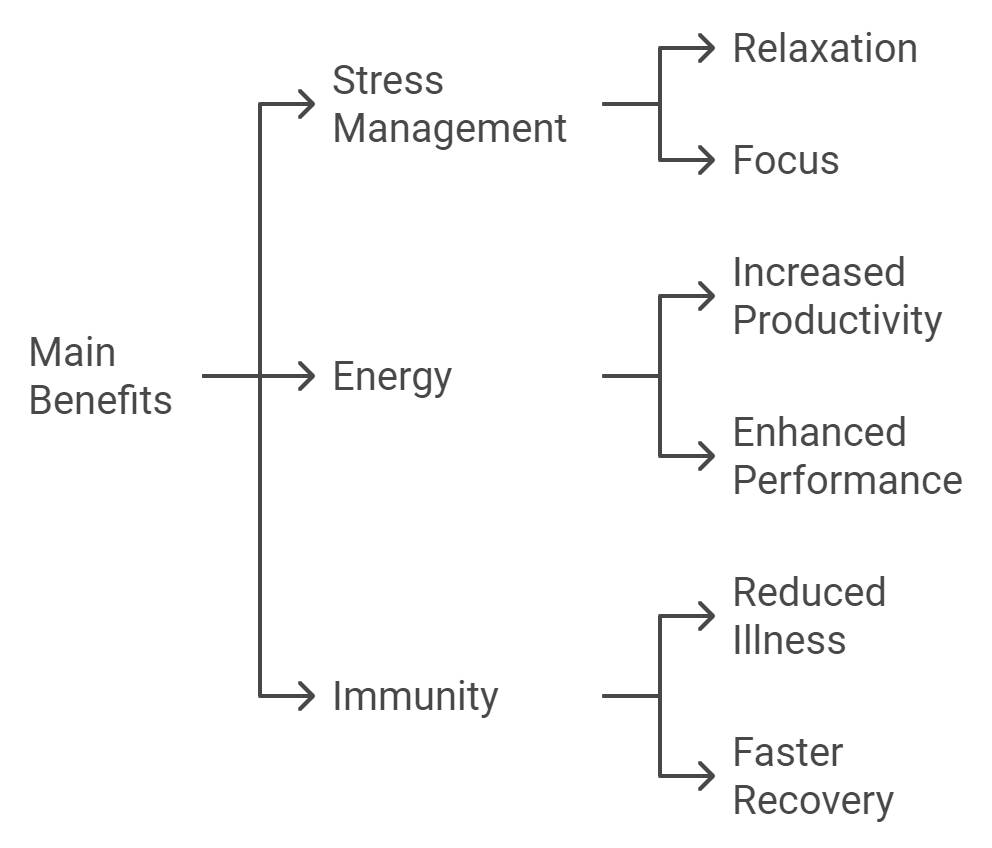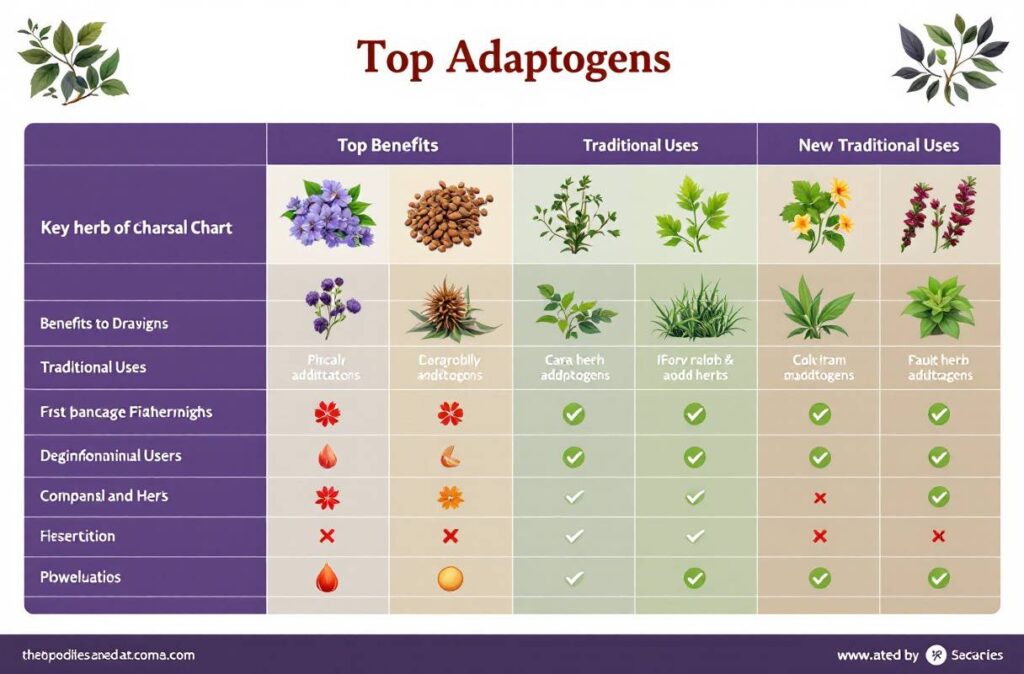Feeling overwhelmed by life’s daily stresses?
Meet your new allies in the battle against burnout: adaptogenic herbs. These remarkable natural compounds have been silently revolutionizing the way we handle stress for centuries, yet they’re more relevant now than ever.
Whether you’re a busy professional struggling with energy levels, an athlete seeking better recovery, or someone simply looking to maintain balance in a chaotic world, adaptogens offer a time-tested solution. But what makes these herbs so special?
Let’s dive into the fascinating world of adaptogenic herbs and discover how these natural wonders could be the missing piece in your wellness puzzle. From ancient wisdom to modern science, your journey to better stress management and enhanced vitality starts here.
Introduction to Adaptogenic Herbs
What are Adaptogenic Herbs?

Think of adaptogens as your body’s best friend, quietly working in the background to keep things chill and steady, help manage stress and keep your energy cruising at just the right speed.
“Adaptogenic herbs represent one of nature’s most sophisticated responses to stress, offering a comprehensive approach to both mental and physical resilience.”
Dr. Andrew Weil, M.D., Integrative Medicine Pioneer
History and Traditional Use
Adaptogens aren’t the new kids on the block; they’ve been around, playing major roles in age-old health remedies. Different cultures have sworn by these botanical buddies for their healing mojo. Let’s take a moment to peek into the past at how some of the heavy-hitters have been used:
Table: Historical Use of Adaptogenic Herbs
| Adaptogenic Herb | Traditional Use | Region of Origin |
|---|---|---|
| Ashwagandha | Stress buster, energy lifter | India (Ayurveda) |
| Rhodiola Rosea | Tiredness tamer, endurance | Siberia, Scandinavia |
| Holy Basil | Mind-body buddy | India (Ayurveda) |
| Ginseng | Power puncher, immunity champ | Asia (Traditional Chinese Medicine) |
These green goodies have starred in healing methods like Ayurveda and Traditional Chinese Medicine, proving they ain’t no fluke. Their timeless use highlights their role in natural health and wellness strategies.
Want to get these fantastic greens into your routine? Check out our herbal supplements guide, where you’ll find the lowdown on specific adaptogens like ashwagandha and rhodiola rosea.
By getting cozy with the history and boons of adaptogenic herbs, you can make savvy decisions on weaving them into your health journey. And hey, picking natural supplements that fit your wellness groove can lead to a happier, healthier you!
Benefits of Adaptogenic Herbs
Adaptogenic herbs, nature’s little helpers, pack a punch when it comes to keeping you feeling your best. They can help you chill out, get you through that afternoon slump, and keep you from catching every cold that comes your way—simple as that.

“The unique ability of adaptogens to regulate stress response and support overall homeostasis makes them invaluable tools in modern stress management and wellness protocols.”
David Winston, RH(AHG), Clinical Herbalist and Ethnobotanist
Stress Management
Feeling stressed? These herbs are like your personal zen masters. They chat with your adrenal glands—those little guys pumping out stress hormones like cortisol. By talking them down, adaptogens help you feel chill and stable even when life’s throwing curveballs. Hit up some Ashwagandha or Rhodiola Rosea next time the going gets rough. They’re stress-busting pros.
Energy and Stamina Boost
Ever wish you had a bit more pep in your step? Adaptogens work behind the scenes to keep you buzzing with energy and stamina. They help fight off tiredness and prep your bod to tackle anything from gym sessions to marathon Netflix binges. Check out Ginseng or Rhodiola Rosea when you need to power through.
Immune System Support
Catching colds like it’s a hobby? Not on adaptogens’ watch. These herbal heroes help fortify your defenses against the bugs and germs knocking on your door. Holy Basil and Ginseng are your immune system’s best pals. Want more on supercharging your immunity with herbs? Swing by our herbal supplements guide.
| Herb | Stress Mellowing | Energy Perk | Immune Defense |
|---|---|---|---|
| Ashwagandha | Yep | Decent | Yep |
| Rhodiola Rosea | Yep | Sky-high | Decent |
| Holy Basil | Yep | Chill | Sky-high |
| Ginseng | Moderate | Sky-high | Sky-high |
So, next time you need to chill, power up, or outsmart the germs, adaptogenic herbs should be your go-to. Make these into your everyday health routine, and you’ll uncover the magic they bring. Curious about diving deeper? Check out our take on choosing natural supplements.
Understanding How Adaptogens Work
Adaptogens and Hormonal Balance
Adaptogenic herbs have a knack for keeping our hormones in check, working smoothly with the body’s own endocrine system to regulate hormones. They lend a hand in leveling hormones, especially the ones that like to spike when stress hits—think cortisol and adrenaline.
Here’s a quick look at some hormones adaptogens buddy up with:
| Hormone | What It Does | How Adaptogens Help |
|---|---|---|
| Cortisol | Reacts to stress | Can lower and keep levels in the safety zone |
| Adrenaline | Kicks in when stressed | Helps dial down adrenaline production |
| Insulin | Keeps sugar in check | Might even things out |
| Thyroid Hormones | Runs the metabolism show | Could support hormone production |
Take Ashwagandha, for example. It’s a champ at putting the brakes on cortisol levels, making it a hero for folks dealing with chronic stress. For the full scoop on Ashwagandha perks, hop over to our article on ashwagandha benefits.

Adaptogens and the Body’s Stress Response
Adaptogens are like the secret sauce for handling stress. They tinker with the hypothalamic-pituitary-adrenal (HPA) axis to keep things cool in the stress department.
Why adaptogens rock at taming stress:
- Tougher Resilience: They help you roll with life’s punches better.
- Energy Boost: Provide a steady stream of energy minus the need for caffeine.
- Mood Smoothing: Keep anxiety and mood swings in check.
Take Rhodiola Rosea, for example. It’s awesome at ramping up energy and kicking fatigue out the door, perfect for anyone craving a natural lift. For juicy details, see our write-up on rhodiola rosea benefits.
Getting a handle on how these adaptogenic stars work can help anyone decide if they’re worth adding to the daily routine. For tips on picking the right herbal pals for you, check out our herbal supplements guide.
Popular Adaptogenic Herbs
Let’s chat about some awesome adaptogenic herbs and how they can give your health a little nudge in the right direction.

Ashwagandha
Meet Ashwagandha, aka Withania somnifera—a superstar hailing from traditional Ayurvedic medicine. This one’s all about stress busting and boosting up your energy levels.
| Benefit | Description |
|---|---|
| Bye-bye Stress | Kicks cortisol (y’know, that stress hormone) to the curb |
| Energy Boomer | Keeps you going with extra stamina and endurance |
| Hormone Checker | Helps your thyroid and keeps hormones on track |
Wanna dig deeper? Check out the ashwagandha benefits.
Rhodiola Rosea
Say hello to Rhodiola Rosea or the fabulous “golden root.” It thrives in super chilly, high-up places and is your go-to for shaking off fatigue and staying sharp.
| Benefit | Description |
|---|---|
| Stress Shield | Buffs up how your body handles stress |
| Brain Booster | Helps you focus and gives your brain some extra oomph |
| Pep-Pills | Says goodbye to tiredness and steps up physical power |
Curious about Rhodiola? Dive into more info in our rhodiola rosea benefits.
Holy Basil
Now, let’s meet Holy Basil, or Ocimum sanctum, lovingly dubbed “Tulsi.” This little wonder’s all about keeping you calm and collected, with oodles of health perks.
| Benefit | Description |
|---|---|
| Anxiety Buster | Waves goodbye to anxiety and ushers in tranquility |
| Immune Hero | Gears up your immune system to take on the baddies |
| Cell Saver | Fights off those mean free radicals with its antioxidant armor |
Keen on Tulsi? Our herbal supplements guide has the lowdown.
Ginseng
Here’s Ginseng, a household name in the world of adaptogens, famed for zinging up your energy and giving your immune system a helping hand. With stars like Panax ginseng and American ginseng, it’s a proven crowd-pleaser.
| Benefit | Description |
|---|---|
| Energy Zapper | Boots futigue out the door and powers up your energy |
| Immunity Booster | Rallies your immune troops into action |
| Mind Magnifier | Tunes up memory and mental prowess |
Want the full scoop? Flip through our ginseng supplements guide.
By tuning into what these adaptogenic champs bring to the table, you can slide them into your life to keep stress at bay, pump up your energy, and feel downright better all around. Need tips on getting these veggies into your groove? Catch more in our guide to natural supplements.
Adding Adaptogens into Your Day-to-Day
Blending adaptogenic herbs into your daily life can bring a variety of perks. Getting clued up on their different forms and how much to take can help you make the most of these natural wonders.

Types of Adaptogenic Herbs
These herbs come in all sorts of shapes and sizes to fit what you like and need. Here are some you might find:
- Capsules and Tablets: These are handy for anyone who likes to know precisely how much they’re getting.
- Tinctures: Liquid goodies that you can mix into drinks or down straight.
- Powders: Perfect for tossing into your smoothies, teas, or meals.
- Teas: A gentle sip of adaptogens, often mixed with other good-for-you herbs.
- Dried Herbs: Use these in age-old remedies or toss them into your cooking.
How Much and How Often?
When adding these little helpers to your routine, you gotta stick to the usual doses to keep things safe and sound. Check out these general pointers for some popular adaptogens:
| Adaptogen | Daily Dosage |
|---|---|
| Ashwagandha | 300-500 mg |
| Rhodiola Rosea | 200-600 mg |
| Holy Basil | 300-2000 mg |
| Ginseng | 200-400 mg |
Just a heads-up: These are average doses. It’s a smart move to talk with a healthcare pro for personalized advice.
Tips on Using Adaptogens:
- Ease In: Try one adaptogen at a time and start with a small dose to see how you feel.
- Stick with It: Using them regularly can help you reap the full benefits.
- Eat Well: Pair adaptogens with a healthy diet to give them a little extra kick.
- Keep Hydrated: Drinking water is good for you and helps these herbs do their thing.
- Take Note of Changes: Jot down any shifts in mood or energy to see how they’re working.
If you’re new to these natural aids, check out our herbal supplements guide for some extra tips. Always remember to look into any potential interactions with meds, which you can find in our section on precautions and considerations.
Grasping the different types and right amounts means adding adaptogens like ashwagandha, rhodian roses, and ginseng to your daily mix can be both satisfying and beneficial. For more ways to boost your well-being, think about other natural goodies like turmeric and green tea extract.
Precautions and Considerations
Thinking about adding adaptogenic herbs to your daily grind? Let’s chat about some important points to keep things safe and – you know – all smooth sailing.
Consultation with Healthcare Providers
First things first, have a chinwag with your doc before diving into the world of adaptogenic herbs. They’ve got the know-how to tailor advice according to your unique health situation—be it long-running health issues, special meds you’re on, or if you’re just aiming to boost your overall mojo. This is extra important for folks dealing with long-term health matters or those older and wiser trying out natural health vibes. For more witty tidbits, check out our herbal supplements guide and choosing natural supplements.
Possible Interactions with Medications
Now, these herbs can be a little tricky—they might mess with your meds, swapping out their mojo or causing some unwanted hiccups. Peep the handy table below for some common adaptogens and their possible mix-ups.
| Adaptogenic Herb | Medication Mayhem |
|---|---|
| Ashwagandha | Watch out with diabetes meds, blood pressure stuff, and immuno-defenders (ashwagandha benefits) |
| Rhodiola Rosea | Keep an eye on it if you’re on antidepressants or blood pressure fixers (rhodiola rosea benefits) |
| Holy Basil | Not a fan of blood thinners and diabetes routines |
| Ginseng | Ginseng might not play nice with blood thinners, diabetes meds, or pep pills (ginseng supplements guide) |
With these possible interactions lurking, give your healthcare dude or dudette a shout. They’ll spot any red flags and steer you toward other options or tweaks for what you’re already on. If you’re curious about more herb mojo, take a stroll through our pages on best turmeric supplements and st. johns wort supplements.
Exploring adaptogens is all well and good, but keeping your noggin on straight is key to striking the right health balance.
Stay clued in and keep those lines open with health pros. That way, you can savor the goodness these herbs bring without giving any headaches a fighting chance.
Embracing a Balanced Lifestyle
Holistic Health Approach
Looking after yourself isn’t just about eating green and going for the occasional jog – it’s about the whole package. Taking care of your mind, heart, body, and even that soul of yours. It’s like keeping all parts of a car in tip-top shape so you don’t break down mid-journey. This is where adaptogenic herbs step in as your trusty sidekicks, helping you tackle stress and stay on top of life’s craziness.
Take Ashwagandha or Rhodiola Rosea, for example. These bad boys help your body toughen up against stress like a superhero suits up against villains. Mix them up with some good habits like working out, chowing down on the right foods, catching them Z’s, and chilling out with yoga or meditation.
When you bring adaptogens into your routine alongside a holistic approach, you go from feeling like a deflated balloon to living your best life. And if you want to know more about the right jams to keep your zen on point, take a look at our herbal supplements guide.
Combining Adaptogens with Healthy Habits
Want the secret sauce for feeling awesome? Blend adaptogenic herbs into your daily drill for some serious benefits. Here’s how you can buddy them up with the habits that keep you healthy:
- Balanced Diet: Pile your plate high with the rainbow—fruits, veggies, proteins, and grains. Stir in adaptogens or sprinkle them into your morning smoothie for a boost.
- Regular Exercise: Whether it’s a stroll in the park, a jog down the street, or rocking out in a yoga class, stay active. Adaptogens have your back, helping you keep your energy levels up and recover faster.
- Adequate Sleep: Get your 7-9 hours each night. Some adaptogens, like Ashwagandha, can be your sleep-buddy, helping you drift off. Check out our suggestions for natural sleep aids if counting sheep isn’t cutting it.
- Stress Management: Find what chills you out, whether it’s meditation, a favorite hobby, or just binge-watching your favorite show. Adaptogens help your body not lose its cool.
- Hydration: Keep the water flowing. Sipping all day means adaptogens can do their magic more effectively.
Pair these habits with adaptogens, and you’ll feel the difference, living a life that’s balanced and buzzing with energy. Want to know the smart picks for getting your adaptogen game on? Our guide on choosing natural supplements has plenty more tips.
| Healthy Habit | Recommended Adaptogen | Benefits |
|---|---|---|
| Balanced Diet | Turmeric | Keeps inflammation at bay |
| Regular Exercise | Ginseng | Boosts stamina and keeps you going |
| Adequate Sleep | Ashwagandha | Helps you sleep like a log |
| Stress Management | Chamomile | Calms your nerves |
For anyone on the lookout for natural ways to feel better, adaptogens offer a quiet but mighty help. Pair them with habits that take care of body and mind, and you’re on your way to living life fully charged. Curious about how to make the most of turmeric’s power? Swing by and check out our article on the best turmeric supplements.
Conclusion
As we’ve explored, adaptogenic herbs represent a powerful bridge between ancient wisdom and modern wellness needs.
From stress management and energy enhancement to immune system support, these versatile botanicals offer a natural approach to maintaining balance in our hectic lives.
Whether you choose Ashwagandha for stress relief, Rhodiola for energy, or Holy Basil for overall wellness, the key lies in mindful integration with a healthy lifestyle and proper consultation with healthcare providers.
Remember, adaptogens work best as part of a holistic approach to health, supporting not just your body but your entire well-being. Ready to embrace the adaptive power of nature? With proper knowledge and consideration, you’re now equipped to make informed choices about incorporating these remarkable herbs into your wellness routine.
FAQs :
What exactly are adaptogenic herbs?
Adaptogenic herbs are natural substances that help the body adapt to stress and restore balance. They work by supporting the body’s stress-response system and promoting homeostasis.
How long does it take for adaptogens to work?
Most people notice initial benefits within 2-3 weeks of consistent use, though optimal results typically develop over 2-3 months of regular supplementation.
Can I take multiple adaptogens together?
Yes, many adaptogens work synergistically. However, it’s best to start with one at a time and gradually add others while monitoring your body’s response.
Are adaptogenic herbs safe for everyone?
While generally safe, adaptogens may not be suitable for pregnant women, those with certain medical conditions, or people taking specific medications. Always consult a healthcare provider before starting.
What’s the best time to take adaptogenic herbs?
Most adaptogens are best taken in the morning or early afternoon to support energy levels throughout the day. Some, like Ashwagandha, can also be taken in the evening for sleep support.
Additional Resources
Journal of Alternative and Complementary Medicine: Adaptogens Research
https://www.liebertpub.com/journal/acm
National Center for Complementary and Integrative Health: Herbs and Botanicals https://www.nccih.nih.gov/health/herbsataglance
Frontiers in Nutrition: Adaptogenic Herbs Review
https://www.frontiersin.org/journals/nutrition




